|
THE town of
Hannibal, Missouri, has had a number of things to
distinguish it during its eighty years of existence:
business men are acquainted with it as the one-time centre
of the largest lumber trade on the Mississippi River; for
lawyers it has furnished some of the most interesting
criminal cases on record; the readers of sensational news
know it as furnishing many opportunities to the lover of
"scare-heads" in journalism; preachers have regarded it for
years as a promising field for evangelistic effort; but
literary people are interested in it chiefly as the boyhood
home of Mark Twain and the scene of his earliest
writings.
It has changed much since Tom Sawyer's
"gang" made things lively for the sleepy little village of
St. Petersburg. The town has reached out until it sweeps
around Lover's Leap on one side and straggles up Holiday's
Hill on the other. Widened, well-paved streets stretch out
to the westward, well set with substantial business houses
and modern dwellings. Walking along these streets you meet
well-dressed women, brisk men, and decorous-looking
children; and there is little to remind you of rollicking,
incorrigible Tom and angular old-fashioned "Aunt Polly,"
who thumped his head and loved him with all the ardor of
her warm old heart.
You say, with a sense of disappointment:
"It is not what it was. The place has changed, and the
people too." But wait a little. Let us walk out Main Street
a few squares. You see that hill rising directly before
you, with what seems to be the remains of an old quarry on
one side and a few clusters of foliage clinging to the
other? It requires a small effort of the imagination to
clothe it once more with original forest. Obliterate the
modern cottages scattered over it, restore the Welchman's
cabin, and you have Holiday's Hill much as it was when Huck
and Tom clambered over it on their way to the Haunted House
to dig for buried treasure.
There to the left is a drug-store. It was
a drug-store fifty years ago, with the same name beside the
doorway, and the same druggist dispensing pills and powders
from behind the same counter. The Hannibal Weekly Journal,
owned and edited by Orion Clemens, was printed for a while
in the rooms over this drug-store; and here, according to
the recent statement of Mr. Samuel Moffett, "the
thirteen-year-old boy served in all capacities, and, in the
occasional absences of his chief, revelled in personal
journalism, with original illustrations hacked on wooden
blocks with a jack-knife, to an extent which riveted the
town's attention, 'but not its admiration.'"
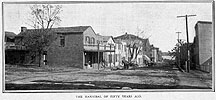 Turn into one of the
cross-streets and look about you. You are in the Hannibal
of fifty years ago, picturesque and unpainted externally,
cobwebby and deserted internally. Walk a short distance out
Hill Street, and you come to the plain little frame house
which was the home of the Clemens family during the greater
part of their residence in Hannibal. Immediately in the
rear of it, on North Street, is a tumble-down shanty which
was the home of Thomas Blankenship, better known to the
public as Huckleberry Finn. Turn into one of the
cross-streets and look about you. You are in the Hannibal
of fifty years ago, picturesque and unpainted externally,
cobwebby and deserted internally. Walk a short distance out
Hill Street, and you come to the plain little frame house
which was the home of the Clemens family during the greater
part of their residence in Hannibal. Immediately in the
rear of it, on North Street, is a tumble-down shanty which
was the home of Thomas Blankenship, better known to the
public as Huckleberry Finn.
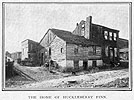 One surviving member
of this family remains--a sister of the illustrious Huck.
She seems, however, to be little impressed with the
distinction conferred on the family. When questioned as to
the identity of her brother with Mark Twain's hero, she
said: One surviving member
of this family remains--a sister of the illustrious Huck.
She seems, however, to be little impressed with the
distinction conferred on the family. When questioned as to
the identity of her brother with Mark Twain's hero, she
said:
"Yes, I reckon it was him. Sam and our
boys run together considerable them days, and I reckon it
was Tom or Ben, one; it don't matter which, for both of
'em's dead."
Evidently it was not given to more than
one, in those days, to see the possibilities in a character
like Huckleberry Finn.
"He was nothing more than a plain
reprobate," one of the old "boys" declared. "I knew him,
and I could never see anything picturesque about him. The
principal exploit of his which I now recall is the fact
that he once stole a dearly prized kite of mine. He had
been regarding it with envious eyes for days, and at last,
when he knew I was not at home, he went around and told my
mother that I had sent him for the kite. Of course he got
it, and that was the last I ever saw of it; but I had my
satisfaction"--with a stern, almost ferocious, expression:
"I punched his head!"
Evidently the memory of that theft still
rankles, and renders the judge reluctant to acknowledge the
fine points in a character like Huckleberry Finn,
considered purely from a literary stand-point.
Turning back, you cross Main Street and
come to what was once Water Street. You feel yourself miles
and miles removed from the busy little city, which is still
so close to you that sounds of its cheerful traffic are
plainly audible. Not that this is really what it was, but,
lying there in its desertion and decay, it is very
suggestive of the drowsy, contented life of which Mark
Twain wrote:
"After all these years I can picture that
old time to myself now, just as it was then: the white town
drowsing in the sunshine of a summer morning; the streets
empty, or pretty nearly so, one or two clerks sitting in
front of the Water Street stores, with their
splint-bottomed chairs tilted back against the wall, chins
on breast, hats slouched over their faces, asleep--with
shingle shavings enough around to show what broke them
down; a sow and a litter of pigs loafing around the
sidewalks, doing a lively business in watermelon rinds and
seeds; two or three lonely little freight-piles scattered
about the 'levee,' a pile of 'skids' on the slope of the
stone-paved wharf, and the fragrant town-drunkard asleep in
the shadow of them; two or three wood flats at the head of
the wharf, but nobody to listen to the peaceful lapping of
the wavelets against them; the great Mississippi, the
magnificent Mississippi, rolling its mile-wide tide along,
shining in the sun, the dense forest away on the other
side; the 'point' above town and the 'point' below town,
bounding the river-glimpse and turning it into a sort of
sea, and withal a very still, and brilliant, and lonely
one."
 A short distance
below town, lying on this still and shining sea, is a
wooded island which has been known by various names--the
Jackson's Island on which "The Black Avenger of the Spanish
Main" grounded his raft and landed his pirate crew on their
first voyage of adventure and conquest. Since then it has
been called Pete's Island, in honor of the chief of an
older and more formidable band of pirates who had their
rendezvous there. It has also been known as Glasscock's
Island, and at present is Pearl Island. A short distance
below town, lying on this still and shining sea, is a
wooded island which has been known by various names--the
Jackson's Island on which "The Black Avenger of the Spanish
Main" grounded his raft and landed his pirate crew on their
first voyage of adventure and conquest. Since then it has
been called Pete's Island, in honor of the chief of an
older and more formidable band of pirates who had their
rendezvous there. It has also been known as Glasscock's
Island, and at present is Pearl Island.
You are perhaps a traveller, something of
a mountain-climber, so you will not mind the walk to the
top of Holiday's Hill, from which point we have a view of
the river and town, with the wooded shore on the Illinois
side. Let Mark Twain describe it for us, as he comes back
to it after a number of years, with a vision broadened by
travel and experience, and a heart warm with tender
memories:
"It was a Sunday morning, and everybody
was abed yet. So I passed through the vacant streets, still
seeing the town as it was and not as it is, and recognizing
and metaphorically shaking hands with a hundred familiar
objects which no longer exist, and finally climbing
Holiday's Hill to get a comprehensive view. The whole town
spread out before me then, and I could mark and fix every
locality, every detail. Naturally I was a good deal moved.
I said, 'Many of the people I once knew in this tranquil
refuge of my childhood are now in heaven; some, I trust,
are in the other place.'
"From this vantage-ground the extensive
view up and down the river, and wide over the wooded
expanse of Illinois, is very beautiful--one of the most
beautiful on the Mississippi, I think; which is a hazardous
remark to make, for the eight hundred miles of river
between St. Louis and St. Paul afford an unbroken
succession of lovely pictures. It may be that my affection
for the one in question biases my judgment in its favor; I
cannot say as to that. No matter; it was satisfyingly
beautiful to me, and it had the advantage over all other
friends whom I was about to greet again--it had suffered no
change; it was as fresh and comely and gracious as ever it
had been; whereas the faces of the others would be scarred
by the campaigns of life, and marked with their griefs and
defeats, and would give me no upliftings of spirit."
Looking north from Holiday's Hill is a
picturesque bit of country, the bluffs closing about a
narrow gorge, through which flows the stream known in those
days as the Still-House Branch. Here, through long lazy
afternoons, Huck and Tom played Robin Hood, and here was
located the Haunted House where "Injun Joe" found the
buried treasure. We may believe this but little changed. A
few houses cluster about the opening at the railroad, and
as we stop to make some inquiries about localities a
barefooted boy with a dilapidated hat two sizes too large
for him comes and leans against the fence and regards us
with frank, unflattering eyes. Another joins him, and we
hear them addressed as "Buck" and "Bill." Seeing no
prospect of diversion, they vault over the low board fence
and disappear in the bushes which skirt the hill-side.
After all, we think, localities may
change, but human nature, if let alone, remains about the
same. We may build fine houses, and dress and groom, and
prune and train, until we succeed in raising up a
generation of children looking like fashion plates and
acting like little old men and women, but give it half a
chance and it springs up into the same rollicking, untamed
creature of luxuriant fancy and inexhaustible resources as
the two boys who have been the emulation and delight of
several generations of children.
Perhaps this explains, in some degree, the
unfailing interest which still attaches to these early
books of Mark Twain. Other writers have given us excellent
studies of human nature--of child nature--but the types are
imperfect, and so wrought about by peculiarities of style,
national characteristics, and a thousand and one things, as
to make a critical literary taste necessary to their full
appreciation. Not so in this case. Mark Twain has given us
not the boy of the Mississippi Valley as he was fifty years
ago, but a broad type which finds ready interpreters in
every nook and corner of the nation and in every passing
generation.
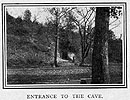 About two miles
below town is the cave in which Tom had some of his most
thrilling adventures. The opening lies well back in the
side of a hill, with a pretty park and athletic ground
around it, which are in frequent use for picnics and ball
games. Passing inside, you thread the same labyrinth of
narrow corridors, with rifts dropping off at your feet as
if into the very bowels of the earth. Here is the spring of
clear, cold water where Tom and Becky sat down to watch
their last bit of candle go out, leaving them in dense and
utter darkness. There is the corridor known as "Bat Alley,"
where myriads of those creatures cling to walls and
ceiling, and, disturbed by the light of your torch, beat
about your head in a manner far from comfortable. About two miles
below town is the cave in which Tom had some of his most
thrilling adventures. The opening lies well back in the
side of a hill, with a pretty park and athletic ground
around it, which are in frequent use for picnics and ball
games. Passing inside, you thread the same labyrinth of
narrow corridors, with rifts dropping off at your feet as
if into the very bowels of the earth. Here is the spring of
clear, cold water where Tom and Becky sat down to watch
their last bit of candle go out, leaving them in dense and
utter darkness. There is the corridor known as "Bat Alley,"
where myriads of those creatures cling to walls and
ceiling, and, disturbed by the light of your torch, beat
about your head in a manner far from comfortable.
The small stream known as Bear Creek, "so
called, perhaps, because it was always so particularly bare
of bears," skirts the town on the south side, and
notwithstanding his statement that only an expert can find
it, a number of present-day boys are intimately acquainted
with all the swimming-holes, and Mark Twain's personal
experience is frequently repeated: "I used to get drowned
in it regularly every summer, and be drained out and
inflated and set going again by some chance enemy, but not
enough of it is unoccupied now to drown a person in. It was
a famous breeder of chills and fever in my day. I remember
one summer when everybody in the town had the disease at
once. Many chimneys were shaken down, and all the houses so
racked that the town had to be rebuilt."
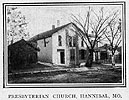 The shabby little
brick church where the children of that day attended
Sunday-school, and suffered through the eternity of a long
Presbyterian sermon, is now used as a court-house. We have
it on good authority that the picture of the painfully
clean boy standing at the door of this church on Sunday
morning, trading licorice, fish-hooks, and marbles for
tickets of various colors and values, and through this
traffic obtaining the distinction of a prize pupil,
notwithstanding the fact that he was never known to recite
two verses, not to mention two thousand, is in no respect
overdrawn. The boys and girls who attended that school also
recall vividly the superintendent, a man named Cross, to
whom they affectionately referred as "Cross by name and
cross by nature." The shabby little
brick church where the children of that day attended
Sunday-school, and suffered through the eternity of a long
Presbyterian sermon, is now used as a court-house. We have
it on good authority that the picture of the painfully
clean boy standing at the door of this church on Sunday
morning, trading licorice, fish-hooks, and marbles for
tickets of various colors and values, and through this
traffic obtaining the distinction of a prize pupil,
notwithstanding the fact that he was never known to recite
two verses, not to mention two thousand, is in no respect
overdrawn. The boys and girls who attended that school also
recall vividly the superintendent, a man named Cross, to
whom they affectionately referred as "Cross by name and
cross by nature."
In searching for boyhood friends and
companions of Mark Twain we are reminded of the condition
of things in the village of St. Petersburg immediately
after the supposed drowning of Tom Sawyer and Joe Harper,
when disputes arose as to who saw the dead boys last in
life, and those who could establish such claim "took to
themselves airs of sacred importance."
"One poor chap, who had no other grandeur
to offer, said, with tolerably manifest pride in the
remembrance,
"'Well, Tom Sawyer, he licked me
once!'"
"But that bid for glory was a failure.
Most of the boys could say that much, and so it cheapened
the distinction too much."
By all odds the most interesting character
connected with the history of those years is Mrs. A. L.
Frazer, formerly Miss Laura Hawkins, presumably the Becky
Thatcher of Tom Sawyer, and the Laura Hawkins of The Gilded
Age. A very gentle and winsome lady she is, with wavy gray
locks about her face, eyes as sparkling as any girl's, and
a charm of manner which marks the genuine woman, no matter
what station in life may claim her. Mrs. Frazer enjoys
talking about her old play-mate, not because he has grown
great and famous, but because he was her old play-mate. Her
heart warms to the memory of those halcyon days, and in her
regard there mingles no questioning of the world's
opinions, no weighing of possible honors. It is one of
those tender and unselfish friendships which some very
lovable women are capable of inspiring and cherishing
through a long lifetime.
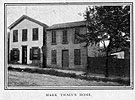 "I remember very
well when we moved into the house opposite where Mr. John
M. Clemens lived," she said. "I remember also the first
time I ever saw Mark Twain. He was then a barefooted boy,
and he came out in the street before our house and turned
hand-springs, and stood on his head, and cut just such
capers as he describes in Tom's 'showing off' before Becky.
We were good friends from the first. One of our favorite
play-places was in the Clemens yard, where we built houses
out of a heap of bricks. On one occasion he accidentally
tumbled our house down on my hand and made blood blisters
on every finger. "I remember very
well when we moved into the house opposite where Mr. John
M. Clemens lived," she said. "I remember also the first
time I ever saw Mark Twain. He was then a barefooted boy,
and he came out in the street before our house and turned
hand-springs, and stood on his head, and cut just such
capers as he describes in Tom's 'showing off' before Becky.
We were good friends from the first. One of our favorite
play-places was in the Clemens yard, where we built houses
out of a heap of bricks. On one occasion he accidentally
tumbled our house down on my hand and made blood blisters
on every finger.
"On another occasion a crowd of boys and
girls went out on the hills of what is now Palmyra Avenue,
to spend a Saturday afternoon. The hill-sides were covered
with trees and brush, and a favorite sport was to bend down
slender saplings and ride, the smaller girls being taken on
behind the larger ones. I was having a fine ride behind one
of the big girls when she suddenly sprang off, and I was
thrown to the ground, striking my head against a stone. I
was taken home unconscious, and was very ill for some time,
and I remember hearing the children talk about how scared
and anxious 'Sam' was."
We can but wonder if it was this illness
which so wrought on Tom's health and spirits, and if it was
his own condition which he so feelingly describes as he
tells of the boy hanging around the gate of the school-yard
anxiously watching for the coming of Becky: "Presently Jeff
Thatcher hove in sight, and Tom's face lighted; but he
gazed a moment, then turned sorrowfully away. When Jeff
arrived, Tom accosted him and 'led up' warily to
opportunities for remark about Becky, but the giddy lad
never could see the bait. Tom watched and watched, hoping
whenever a whisking frock came in sight, and hating the
owner of it whenever he saw she was not the right one. At
last frocks ceased to appear, and he dropped down into the
dumps; he entered the empty school-house and sat down to
suffer. Then one more frock passed in at the gate, and
Tom's heart gave a great bound. The next instant he was out
and 'going on' like an Indian, yelling, laughing, chasing
boys, jumping over fences at the risk of life and limb,
throwing hand-springs, standing on his head, doing all the
heroic things he could conceive of, and keeping a furtive
eye out all the while to see if Becky Thatcher was
noticing."
If others in the town were unable to see
Huck Finn with Mark Twain's eyes, the same difficulty did
not obtain in this case, for his little sweetheart seems to
have been a universal favorite. One of the old "boys" tells
the story of how on one occasion three of the "gang"
started out into the great world to seek their fortune,
with the understanding that on their return one of the
number should marry Laura Hawkins. How the lucky one was to
be chosen he fails to relate, but it is safe to say that if
the matter had come to settlement after the manner in which
boys usually adjust difficulties, Mark Twain would have had
at least "a fighting chance." But alas for the brave
knights! When they returned the princess was gone! She
might have been carried off in their absence by a dreadful
ogre, or a rival prince might have spirited her away to his
castle, but the unpoetical fact was that her father had
moved away, and that was the end of this little
romance.
On the event of his marriage, Mark Twain
enclosed a card to the brother of Mrs. Frazer, and on the
inner cover was written:
Mrs. ----- (married name unknown to
me).
(Formerly Miss Laura Hawkins, first
sweetheart of one of the within named parties 29 years ago.
Pardon the suggestive figures.)
On the sloping hill-sides of beautiful
Mount Olivet are to be found as many friends and boyhood
companions of the great humorist as walk the streets of the
busy little city two miles away. Here on the very summit,
where a rift in the foliage on intervening hills opens a
view of the great, placid, shining river, is the lot with
its simple head-stones where the greater part of the
Clemens family are sleeping. There is John M. Clemens, the
kindly, dignified, if somewhat unfortunate father, about
whom one hears only the tenderest and most respectful
reminiscences; next to him the mother, from whom her
distinguished son is said to have inherited some of the
traits which have made him famous; Henry Clemens, the
younger brother, who lost his life in a steamboat explosion
at Memphis; and last in the row, Orion Clemens, the elder
brother, under whose tutelage Samuel Clemens began his
literary career.
In his recent biographical sketch, Mr.
Samuel Moffett says:
"Native character will always make itself
felt, but one may wonder whether Mark Twain's humor would
have developed in quite so sympathetic and buoyant a vein
if he had been brought up in Ecclefechan instead of in
Hannibal, and whether Carlyle might not have been a little
more human if he had spent his boyhood in Hannibal instead
of in Ecclefechan."
Without claiming an intimate knowledge of
the facilities afforded by Ecclefechan for the development
of native character, we venture the belief that not
Ecclefechan nor any other locality could have furnished
better facilities for the untrammelled development of this
native genius than it enjoyed in Hannibal.
Before all and above all, Mark Twain is a
great interpreter of human nature--not the groomed and
polished species of the drawing-room, but the unpruned and
untrained article which grew up spontaneously in such
congenial soil as Hannibal afforded fifty years ago. Call
it fatalism or faith, but circumstance, or Providence,
usually places within a man's reach just the facilities
necessary for the making of his individual character and
the accomplishment of his peculiar work. Not all the
universities in all the land could have done so much for
Mark Twain as did the contact with primitive life and
character in this river town, and the later and wider
experience of a pilot on the Mississippi River.
|



